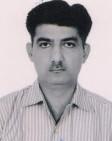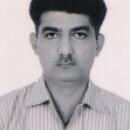
Sector 39, Gurgaon, India - 122018.
1
Details verified of Pankaj Chawla✕
 Identity
Identity
 Education
Education
Know how UrbanPro verifies Tutor details
Identity is verified based on matching the details uploaded by the Tutor with government databases.
English
Hindi Mother Tongue (Native)
![]() PEC Chandigarh 2006
PEC Chandigarh 2006
Master of Engineering - Master of Technology (M.E./M.Tech.)
Sector 39, Gurgaon, India - 122018
![]() ID Verified
ID Verified
![]() Phone Verified
Phone Verified
![]() Email Verified
Email Verified
Report this Profile
Is this listing inaccurate or duplicate? Any other problem?
Please tell us about the problem and we will fix it.
Class Location
![]() Online Classes (Video Call via UrbanPro LIVE)
Online Classes (Video Call via UrbanPro LIVE)
![]() Student's Home
Student's Home
![]() Tutor's Home
Tutor's Home
Years of Experience in Class 11 Tuition
19
Board
ISC/ICSE, State, CBSE
Experience in School or College
Taught mathematics and physics at degree level to students
Subjects taught
Physics, Mathematics
Taught in School or College
Yes
Teaching Experience in detail in Class 11 Tuition
19 years of teaching experience
Class Location
![]() Online Classes (Video Call via UrbanPro LIVE)
Online Classes (Video Call via UrbanPro LIVE)
![]() Student's Home
Student's Home
![]() Tutor's Home
Tutor's Home
Years of Experience in Class 12 Tuition
19
Board
ISC/ICSE, State, CBSE
Experience in School or College
19 years of teaching experience
Subjects taught
Mathematics, Physics
Taught in School or College
Yes
Teaching Experience in detail in Class 12 Tuition
19 years of teaching experience
Class Location
![]() Online Classes (Video Call via UrbanPro LIVE)
Online Classes (Video Call via UrbanPro LIVE)
![]() Student's Home
Student's Home
![]() Tutor's Home
Tutor's Home
Years of Experience in Engineering Diploma Tuition
19
Engineering Diploma Branch
Electrical Engineering Diploma
Experience in School or College
19 years of teaching experience to Diploma BTECH and ME students
Type of class
Crash Course, Regular Classes
Class strength catered to
One on one/ Private Tutions, Group Classes
Taught in School or College
Yes
Electrical Engineering Diploma Subject
Electrical Engineering Drawing, Electric Circuit Theory, Renewable Energy Technology, Electrical Repair And Maintenance, Transmission And Distribution Of Electrical Power, Electrical Design, Estimation And Costing, Power Stations, Control System Components, Instrumentation & Transducers, Power System Operation And Maintenance, Switchgear And Protection, Electrical Energy Audit And Conservation, Electric Drives, Electrical Installation, Power Electronics, Utilization Of Electrical Energy, Electrical Machines, Electrical Measurements And Measuring Instruments
Teaching Experience in detail in Engineering Diploma Tuition
Teaching to diploma students the various courses of electrical engineering
Class Location
![]() Online Classes (Video Call via UrbanPro LIVE)
Online Classes (Video Call via UrbanPro LIVE)
![]() Student's Home
Student's Home
![]() Tutor's Home
Tutor's Home
Years of Experience in BTech Tuition
20
BTech Electrical & Electronics subjects
Non-Conventional Energy Systems, Power System Protection, Regulation & Security, Electronic Measurements And Instrumentation, Circuit Theory, Power System Engineering, Electric Power Quality, Network SynthesiS, Electromagnetic Theory, Electric Energy Systems, Electric Power Stations, Renewable Energy, Neural Networks And Applications, Alternative Energy Sources, Energy Management & Auditing, Electrical Circuit Analysis, Computer Control Of Energy Systems, Electric Drives, Electrical Machinery, Condition Monitoring Techniques For Electrical Equipments, Traveling Waves On Transmission System
BTech Branch
BTech Electrical & Electronics
Type of class
Crash Course, Regular Classes
Class strength catered to
One on one/ Private Tutions, Group Classes
Taught in School or College
Yes
Teaching Experience in detail in BTech Tuition
Teaching experience to students of BTech and MTech
1. Which school boards of Class 12 do you teach for?
ISC/ICSE, State and CBSE
2. Have you ever taught in any School or College?
Yes
3. Which classes do you teach?
I teach BTech Tuition, Class 11 Tuition, Class 12 Tuition and Engineering Diploma Tuition Classes.
4. Do you provide a demo class?
Yes, I provide a free demo class.
5. How many years of experience do you have?
I have been teaching for 19 years.
Answered on 19/06/2021 Learn CBSE/Class 10/Science
A covalent bond is formed by the equal sharing of electrons from the participating atoms. The participating electrons are known as shared pairs or bonding pairs. Carbon has four valence electrons, so it can achieve full outer energy by forming four covalent bonds. Carbon can form single, double, or triple bonds with other carbon atoms. When it bonds only with hydrogen atoms, it forms compounds called hydrocarbons.
Class Location
![]() Online Classes (Video Call via UrbanPro LIVE)
Online Classes (Video Call via UrbanPro LIVE)
![]() Student's Home
Student's Home
![]() Tutor's Home
Tutor's Home
Years of Experience in Class 11 Tuition
19
Board
ISC/ICSE, State, CBSE
Experience in School or College
Taught mathematics and physics at degree level to students
Subjects taught
Physics, Mathematics
Taught in School or College
Yes
Teaching Experience in detail in Class 11 Tuition
19 years of teaching experience
Class Location
![]() Online Classes (Video Call via UrbanPro LIVE)
Online Classes (Video Call via UrbanPro LIVE)
![]() Student's Home
Student's Home
![]() Tutor's Home
Tutor's Home
Years of Experience in Class 12 Tuition
19
Board
ISC/ICSE, State, CBSE
Experience in School or College
19 years of teaching experience
Subjects taught
Mathematics, Physics
Taught in School or College
Yes
Teaching Experience in detail in Class 12 Tuition
19 years of teaching experience
Class Location
![]() Online Classes (Video Call via UrbanPro LIVE)
Online Classes (Video Call via UrbanPro LIVE)
![]() Student's Home
Student's Home
![]() Tutor's Home
Tutor's Home
Years of Experience in Engineering Diploma Tuition
19
Engineering Diploma Branch
Electrical Engineering Diploma
Experience in School or College
19 years of teaching experience to Diploma BTECH and ME students
Type of class
Crash Course, Regular Classes
Class strength catered to
One on one/ Private Tutions, Group Classes
Taught in School or College
Yes
Electrical Engineering Diploma Subject
Electrical Engineering Drawing, Electric Circuit Theory, Renewable Energy Technology, Electrical Repair And Maintenance, Transmission And Distribution Of Electrical Power, Electrical Design, Estimation And Costing, Power Stations, Control System Components, Instrumentation & Transducers, Power System Operation And Maintenance, Switchgear And Protection, Electrical Energy Audit And Conservation, Electric Drives, Electrical Installation, Power Electronics, Utilization Of Electrical Energy, Electrical Machines, Electrical Measurements And Measuring Instruments
Teaching Experience in detail in Engineering Diploma Tuition
Teaching to diploma students the various courses of electrical engineering
Class Location
![]() Online Classes (Video Call via UrbanPro LIVE)
Online Classes (Video Call via UrbanPro LIVE)
![]() Student's Home
Student's Home
![]() Tutor's Home
Tutor's Home
Years of Experience in BTech Tuition
20
BTech Electrical & Electronics subjects
Non-Conventional Energy Systems, Power System Protection, Regulation & Security, Electronic Measurements And Instrumentation, Circuit Theory, Power System Engineering, Electric Power Quality, Network SynthesiS, Electromagnetic Theory, Electric Energy Systems, Electric Power Stations, Renewable Energy, Neural Networks And Applications, Alternative Energy Sources, Energy Management & Auditing, Electrical Circuit Analysis, Computer Control Of Energy Systems, Electric Drives, Electrical Machinery, Condition Monitoring Techniques For Electrical Equipments, Traveling Waves On Transmission System
BTech Branch
BTech Electrical & Electronics
Type of class
Crash Course, Regular Classes
Class strength catered to
One on one/ Private Tutions, Group Classes
Taught in School or College
Yes
Teaching Experience in detail in BTech Tuition
Teaching experience to students of BTech and MTech
Answered on 19/06/2021 Learn CBSE/Class 10/Science
A covalent bond is formed by the equal sharing of electrons from the participating atoms. The participating electrons are known as shared pairs or bonding pairs. Carbon has four valence electrons, so it can achieve full outer energy by forming four covalent bonds. Carbon can form single, double, or triple bonds with other carbon atoms. When it bonds only with hydrogen atoms, it forms compounds called hydrocarbons.

Share this Profile
Reply to 's review
Enter your reply*
Your reply has been successfully submitted.
Certified
The Certified badge indicates that the Tutor has received good amount of positive feedback from Students.